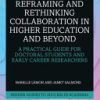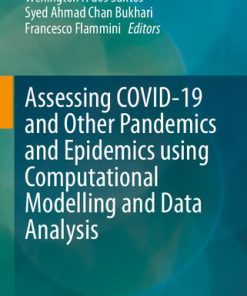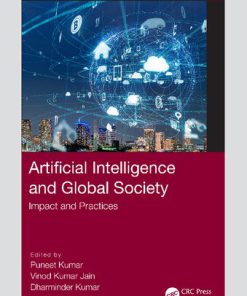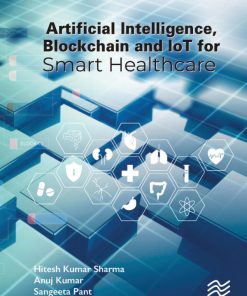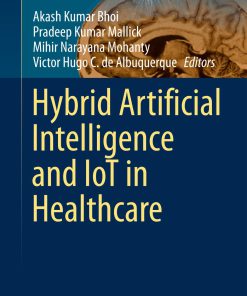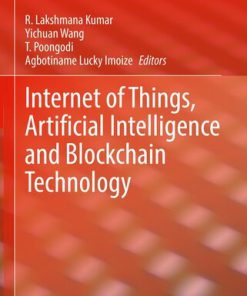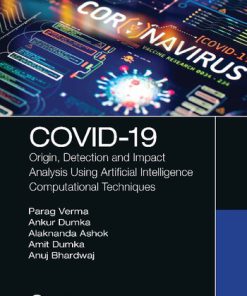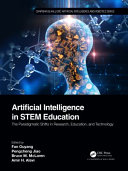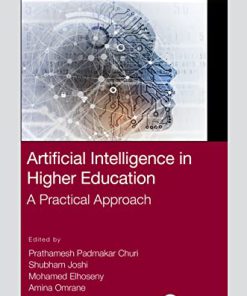Advancements in Artificial Intelligence Blockchain Technology and IoT in Higher Education Mitigating the Impact of COVID 19 1st Edition by Subhendu Kumar Pani, Kamalakanta Muduli, Sujoy Kumar Jana, Srikanth Bathula, Golam Sarwar Khan ISBN 9781774910924 1774910926
$50.00 Original price was: $50.00.$25.00Current price is: $25.00.
Advancements in Artificial Intelligence Blockchain Technology and IoT in Higher Education Mitigating the Impact of COVID 19 1st Edition by Subhendu Kumar Pani, Kamalakanta Muduli, Sujoy Kumar Jana, Srikanth Bathula, Golam Sarwar Khan – Ebook PDF Instant Download/Delivery: 9781774910924 ,1774910926
Full download Advancements in Artificial Intelligence Blockchain Technology and IoT in Higher Education Mitigating the Impact of COVID 19 1st Edition after payment
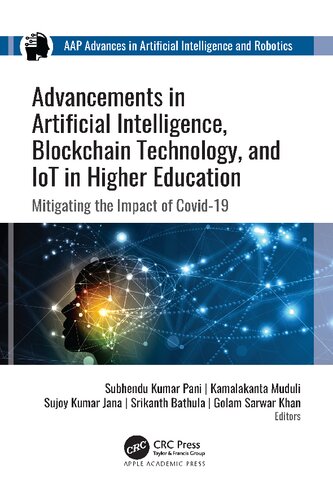
Product details:
ISBN 10: 1774910926
ISBN 13: 9781774910924
Author: Subhendu Kumar Pani, Kamalakanta Muduli, Sujoy Kumar Jana, Srikanth Bathula, Golam Sarwar Khan
Advancements in Artificial Intelligence Blockchain Technology and IoT in Higher Education Mitigating the Impact of COVID 19 1st Edition Table of contents:
Part I AI in Digitalization of Education
1. Growing Role of AI Towards Digital Transformation in Higher Education Systems
1.1 Introduction
1.2 Artificial Intelligences (AI) with Its Advantages and Disadvantages
1.2.1 Advantages of AI
1.2.2 Disadvantages of AI
1.2.3 Artificial Intelligence (AI) in the Education Sector
1.3 Interactive Model of Education System with AI
1.3.1 Intelligent System Adopted Pedagogy and Curriculum for Technical Education System
1.3.2 Intelligent Interactive System
1.3.3 What Effect Would AI Systems have on the Future of Education?
1.4 Assisting Educators with Organizational Tasks
1.4.1 AI and Digital Skills
1.4.2 AI for Student Support
1.4.3 AI As An Academic Discipline
1.4.4 Gaining Knowledge of Environments and Digital Facilitators
1.5 Conclusion
References
2. AI-Based Digital Model in Teaching and Learning, Support Development of Critical Thinking, and Problem Solving for Smart Universities
2.1 Introduction
2.2 AI-Based Digital Model for Teaching
2.3 AI-Based Digital Model for Learner
2.4 AI Support in Developing Critical Thinking Model in Teaching and Learning for Smart Universities
2.5 AI Support in Developing Problem Solving Model in Teaching and Learning for Smart Universities
2.6 Conclusion
References
3. Education 4.0: Artificial Intelligence Dimensions
3.1 Introduction
3.2 Related Study
3.2.1 Literature Review
3.2.2 Research Trend Analysis
3.2.3 Hype Cycle
3.3 Journey: Education from 1.0 to 4.0
3.3.1 Education 1.0
3.3.2 Education 2.0
3.3.3 Education 3.0
3.3.4 Education 4.0 (E4.0)
3.4 Pandemic and Education
3.4.1 Positive Impacts
3.4.2 Negative Impacts
3.5 Artificial Intelligence (AI)
3.5.1 Deep Integration of Artificial Intelligence (AI) with Respective Subjects
3.5.2 Optimization in The Field of AI
3.5.3 Personalized Learning Space
3.5.4 Reciprocity Between Student and Teacher
3.5.5 Optimization of AI in The Blended Teaching
3.5.6 The Idea of Deep Learning (DL)
3.5.7 Big Data Bolsters AI Learning
3.6 Conclusion
References
4. AI-Based Digital Technologies in Smart Universities
4.1 Introduction
4.2 Smart Campus
4.3 Smart Education
4.4 Smart Research
4.5 Discussion
4.6 Conclusion
References
5. Artificial Intelligence and Its Importance for College of Engineering, Science, and Technology, Fiji National University during COVID-19 Pandemic
5.1 Introduction
5.2 Definitions
5.2.1 Defining Technology-Based Education
5.2.2 What Is Blended Learning?
5.2.3 Understanding What Artificial Intelligence (AI) Is All About
5.3 Importance of Artificial Intelligence (AI)
5.3.1 AI Technologies
5.3.2 Recognition Through COVID-19
5.4 Case Study: Technology Fiji National University’s (FNU) – College of Engineering, Science, and Technology (CEST)
5.4.1 Student-Learning Experience
5.4.2 Teacher-Learning Experience
5.4.3 Discussion
5.5 Conclusion
References
Part II Blockchain in Digitalization
6. Blockchain in Higher Education
6.1 Introduction
6.2 Securing Data of Online Learners Using Blockchain Technology
6.2.1 Security and Privacy
6.2.2 Casper Consensus Mechanism with NEO4J Database
6.2.3 Attacks Towards Blockchain Technology
6.3 Blockchain Technology in Higher Education: Prospects, Issues, and Challenges
6.3.1 Impact of Blockchain Technology for Online Students
6.3.2 Improvements Due To Blockchain Technology
6.3.3 Issues with Implementation
6.4 Blockchain Strategy and Management in Social Transformation
6.4.1 Integrating Blockchains
6.4.2 Cost of Blockchains
6.5 Blockchain-Based Virtual Identity in Digital Environment
6.5.1 Creation of Digital Identities
6.5.2 ID Crisis Averted through Blockchain Implementation
6.6 Role of Semantic Blockchain in Higher Education
6.6.1 Semantic Blockchain Technology
6.6.2 Concept of Semantics
6.7 Conclusion
References
7. Blockchain: A Novel and Impeccable Approach in Higher Education
7.1 Introduction
7.1.1 Motivation of The Study
7.1.2 Problem Statement
7.1.3 Objectives of Study
7.1.4 Structure of the Chapter
7.2 Section I
7.2.1 How Blockchain Technology Works?
7.2.2 Related Work
7.2.3 Gaps Found During Literature Review
7.2.4 Features of Blockchain Technology
7.3 Section II
7.3.1 Significance of Blockchain in Education
7.3.2 Applications of Blockchain Technology in Higher Education
7.3.3 Challenges of Blockchain Technology in Higher Education System
7.3.4 Some Technical Challenges of Blockchain
7.4 Conclusion
References
8. Securing Data of Online Learners Using Blockchain Technology
8.1 Introduction
8.2 Literature Review
8.2.1 E-Learning
8.2.2 Blockchain Technology
8.2.3 Implementation of Blockchain Technology in E-Learning Platforms
8.3 Methods and Methodology
8.3.1 Strengths, Weakness, Opportunities, and Threats for E-Learning Platforms
8.4 Discussion
8.5 Implications of Study
8.6 Conclusion
References
9. Tracing the Evolution of Blockchain and Its Implications to Higher Education
9.1 Introduction
9.2 What Is Blockchain?
9.3 History of Blockchain
9.4 Cryptocurrencies and Payment Gateways
9.5 Cryptocurrency Adoption
9.6 Smart Contracts
9.7 What is An Ethereum Blockchain ?
9.8 Difference Between Ether and Other Cryptocurrencies
9.9 What Are Dapps?
9.10 Digital Accounting
9.11 Issues in Implementing Blockchain in Education for Post COVID-19 World
9.12 Networking with Regulatory Bodies
9.13 Education for Multi-Languages
9.14 Implications
9.14.1 Student Records
9.14.2 Transcripts and Certificates
9.14.3 Badges
9.14.4 File Storage
9.14.5 Lessons and Courses
9.14.6 Governance
9.14.7 Libraries
9.14.8 Publishing
9.15 Conclusion
References
Part III IoT
10. Challenges and Opportunities of Using IoT in Engineering Education: The African Perspective
10.1 Introduction
10.1.1 General Application and Impact of the Internet of Things (IoT)
10.1.2 A Basic IoT Infrastructure
10.2 Significance of IoT in Engineering Education
10.3 Internet of Things (IoT) in Engineering Teaching
10.3.1 Implementation of IoT Technologies Into Engineering Education
10.3.2 Engineering Education Approach Using Iot
10.3.3 Technologies Requirements As Applied To The Iot
10.4 Internet of Things (IoT) in Engineering Curriculum and Courses
10.4.1 Delivery of IoT Pedagogy for Engineering Programs
10.4.2 Assessment Challenges of Using IoT in Engineering Education
10.4.3 The Digital Campus
10.5 Enabling Technologies and The African Experience
10.5.1 The Iot-Based Education in Africa, Instructional, and Instructors’ Challenges
10.5.2 Connectivity Challenges
10.5.3 E-Lab Challenges
10.5.4 Quality and Ethics
10.5.5 Financing
10.6 The IoT in Engineering Education Post COVID-19
10.7 Conclusion
References
11. IoT Technologies and Their Applications in Higher Education
11.1 Introduction
11.2 Research Methodology
11.2.1 Research Questions
11.3 Literature Review
11.3.1 IoT Adoption in Education
11.3.2 Benefits of Iot
11.3.3 Challenges of Iot
11.4 Conclusions
11.5 Future Direction
References
12. COVID-19 and Use of Advanced Technology in the Education: Opportunities and Constraints in Brahmaputra Valley, Assam
12.1 Introduction
12.2 Objectives
12.3 Methodology
12.4 Study Area
12.5 Information and Technology Used in Brahmaputra Valley Pre and Post COVID-19
12.5.1 The Scenario Before the Fallout
12.5.2 The Scenario After the Fallout
12.6 Constraints in the Use of ICT in the Valley
12.7 Opportunities in the Use of ICT in the Brahmaputra Valley
12.8 Effective Measures to Introduce ICT
12.9 Notional and Realistic Significance of ICT
12.10 Practical and Theoretical Dimension
12.11 Conclusion
References
Index
People also search for Advancements in Artificial Intelligence Blockchain Technology and IoT in Higher Education Mitigating the Impact of COVID 19 1st Edition:
Tags: Subhendu Kumar Pani, Kamalakanta Muduli, Sujoy Kumar Jana, Srikanth Bathula, Golam Sarwar Khan, Artificial Intelligence
You may also like…
Engineering - Social & Cultural Aspects of Technology
Artificial Intelligence and Global Society: Impact and Practices 1st Edition Puneet Kumar (Editor)
Computers - Artificial Intelligence (AI)
Artificial Intelligence Blockchain and IoT for Smart Healthcare 1st Edition Hitesh Kumar Sharma
Computers - Databases
Computers - Networking
Internet of Things Artificial Intelligence and Blockchain Technology R.Lakshmana Kumar (Editor)
Computers - Artificial Intelligence (AI)
Computers - Artificial Intelligence (AI)
Computers - Artificial Intelligence (AI)

